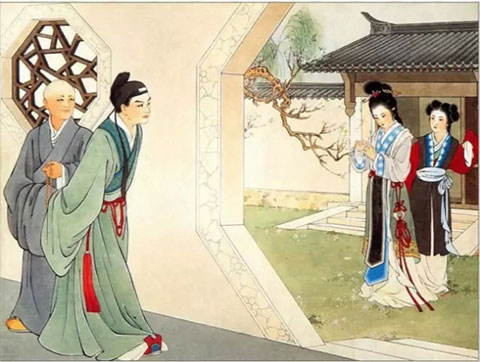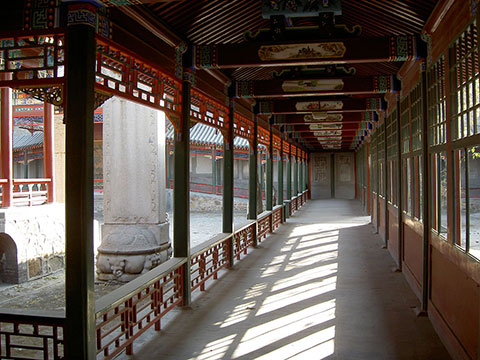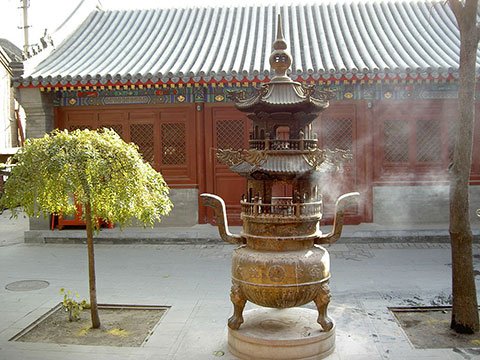I Ching, Yijing or Zhou Yi
"Oracle of the moon": © 2000 LiSe
 Yi Jing, Oracle of the Moon
Yi Jing, Oracle of the Moon


The Red Thread of Fate
Yin Yuan
姻緣

Verse 56 The Red Thread of Fate
From level ground mist is rising
No peace to be found yet
In high places you search for your thread of fate
The 'Red thread of fate' is an East Asian belief originating from Chinese legend. According to the myth, the gods tie an invisible red cord around the ankles of those that are destined to meet one another in a certain situation or help each other in a certain way.
According to Chinese legend, the deity in charge of "the red thread" is believed to be Yuè Xià Lǎorén, often abbreviated to Yuè Lǎo, the old lunar matchmaker god, who is in charge of marriages.
Folklore
One story featuring the red thread of fate involves a young boy. Walking home one night, a young boy sees an old man (Yue Xia Lao) standing beneath the moonlight. The man explains to the boy that he is attached to his destined wife by a red thread. Yue Xia Lao shows the boy the young girl who is destined to be his wife. Being young and having no interest in having a wife, the young boy picks up a rock and throws it at the girl, running away. Many years later, when the boy has grown into a young man, his parents arrange a wedding for him. On the night of his wedding, his wife waits for him in their bedroom, with the traditional veil covering her face.
Raising it, the man is delighted to find that his wife is one of the great beauties of his village. However, she wears an adornment on her eyebrow. He asks her why she wears it and she responds that when she was a young girl, a boy threw a rock at her that struck her, leaving a scar on her eyebrow. She self-consciously wears the adornment to cover it up. The woman is, in fact, the same young girl connected to the man by the red thread shown to him by Yue Xia Lao back in his childhood, showing that they were connected by the red thread of fate.
Xingshi Yinyuan Zhuan
Xingshi Yinyuan Zhuan, literally "The Story of a Marital Fate to Awaken the World", is a Chinese classical novel of the late Ming or early Qing dynasty. One recent scholar calls it "one of China's most underrated traditional vernacular novels", a saga of two families, one a reincarnation of the other, whose "catalog of vices and moral decay conjures up the apocalyptic vision of a doomed nation".
The novel was published under the pen name Xizhou Sheng (西周生), that is, "Scholar of the Western Zhou", the Golden Age in which Confucius lived.
Nothing about the author is known, though authorship has been "wrongly" attributed to Pu, on the grounds that the novel contains many phrases from the Shandong dialect, as does Jin Ping Mei (indeed Jin Ping Mei is quoted in the novel).
Nothing about the author is known, though authorship has been "wrongly" attributed to Pu, on the grounds that the novel contains many phrases from the Shandong dialect, as does Jin Ping Mei (indeed Jin Ping Mei is quoted in the novel).
The date of composition lies between 1618 and 1681, placing it either in the late Ming or early Qing dynasty. It shares structural features and techniques with the Four Classic Ming Novels, such as the 100-chapter paradigmatic length, which is broken down into ten-chapter units, often punctuated with climactic or prophetic episodes in the ninth and tenth chapters.
Other shared features are the careful use of prefiguring and recurrence, use of the devices of oral literature, and highly expressive colloquial style. The author uses crude sexual and scatological expressions, but the scenes of actual sex are comparatively restrained ("As for what transpired after the lamp was blown out, you can use your imagination – there's no need to go into details").
"In high places you search for your thread of fate"
Like most other Chinese temples, the White Cloud Temple at West Lake in Hangzhou is laid out on a north-south axis, with the entrance at the south end. There are five main halls built upon the main axis. On either side of the main axis are two smaller axes, each containing halls dedicated to a variety of deities. In one of those is the seat of Laoren, the old lunar matchmaker god.
Record in the White Cloud Temple:
愿天下有情人,都成了眷属;
May the world's lovers all be ready to become family dependent;
是前生注定事,莫错过姻缘。
It’s a matter of predestined incarnation, and you never miss the destiny that brings lovers together.
愿天下有情人,都成了眷属;
May the world's lovers all be ready to become family dependent;
是前生注定事,莫错过姻缘。
It’s a matter of predestined incarnation, and you never miss the destiny that brings lovers together.

